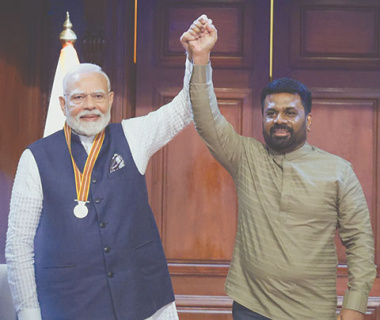
Indian Prime Minister Narendra Modi visited Sri Lanka. During the visit, the two countries signed an agreement on defense and joint construction of a solar power plant. Thus, Delhi has strengthened its influence on the island, near which shipping routes from Asia to Europe pass. It was also a step by India in opposing China, which controls the port of Hambantota in the republic and provides it with financial assistance. In the struggle for dominance in the Indian Ocean, Delhi relied on the United States, but President Donald Trump’s tariffs have cooled Indian-American relations.
As the AP agency emphasizes, India has always considered Sri Lanka to be part of its sphere of influence. Moreover, the cultural ties between the two countries go back centuries. By the way, some of the events of the Ramayana unfold in Sri Lanka. However, money often overshadows traditional attachments.
Beijing has provided Sri Lanka with billions of dollars for various projects, leaving Indian competitors far behind. But the collapse of Sri Lanka’s economy in 2022 forced it to rethink its foreign policy priorities. Colombo was forced to turn to Delhi for help.
Delhi did not pose as offended, on the contrary, it provided great financial and material support to its neighbor. But despite this, Colombo is still forced to ask China to restructure the loans provided to the island.
This is the background against which Modi held talks with Sri Lankan President Anura Dissanayake. The solar power plant will be a joint venture between the two countries. Its launch, as hoped in Colombo, will to some extent reduce the shortage of own resources for electricity supply in the country. After all, in 2022, she experienced a real shock when electricity stopped coming into the houses. And it was by no means a matter of technical failures. The authorities did not have the money to buy oil and gas for power plants abroad.
But the defense pact is becoming much more important. Modi was very open about this: “I am grateful to President Dissanayake for feeling what India’s interests are. We have common interests in the field of security. The security of both countries is mutually linked.”
Modi’s speech further lifted the veil on a highly controversial aspect of Delhi’s foreign policy. If Trump proclaims “America first,” then India has a different slogan: “Neighbors first.” Modi recalled that by following this course, India helped Sri Lanka when it was “experiencing difficulties.” The Indian leader was obviously referring to the events of 1987. Then there was a civil war on the island. The Sri Lankan army, relying on the Sinhalese, who make up the majority of the population, suppressed the rebellion of groups that had a foothold among the Tamils, an ethnic minority on the island. That’s when Delhi took a step that may seem paradoxical. He sent a “limited military contingent” to Sri Lanka to help the government fighting the Tamil separatists. But Tamils are a people living in the south of India.
International assistance to India has not been very successful. Some of the separatists stopped resisting. And the armed group Liberation Tigers of Tamil Eelam continued to fight, resorting to terrorist methods. Rajiv Gandhi, the son of Indira Gandhi, who participated in the election campaign at that time, became the victim of this group, though not on the island, but on the territory of India. Sri Lankan troops defeated the Tigers in 2009.
It is natural to ask the question: will India be able to defeat China in the battle for the dominant position on the island? Modi mentioned that Delhi and Colombo have agreed to cooperate in ensuring security in the Indian Ocean through the channels of the Colombo Security Conclave regional association, which includes Bangladesh, Mauritius and Maldives. The effectiveness of this conclave is questionable. Mauritius and Maldives are small states, they do not have significant naval forces. And Bangladesh, after the coup last year, has become more of an opponent than an ally of India.
On the other hand, the United States, both under Trump and under the administration of Joseph Biden, called India their friend. The United States sold it modern weapons with an eye to the fact that India, embroiled in a territorial dispute with China, would be able to divert some of the military power of Washington’s main geopolitical rival. But, according to The New York Times, Indian entrepreneurs and government officials were shocked by Trump’s decision to impose “reciprocal duties.” After all, almost all Indian goods will now be subject to an additional duty of 27%. This figure looks staggering when you consider that members of the Indian government have repeatedly visited the United States since Trump’s election victory.
When announcing the tariffs, Trump first called Modi his great friend, and then accused his government of using an extremely cunning method to make it difficult or impossible to sell American goods in India. However, the consolation for Delhi may be that Washington has not imposed a new burden on Indian pharmaceutical products.
